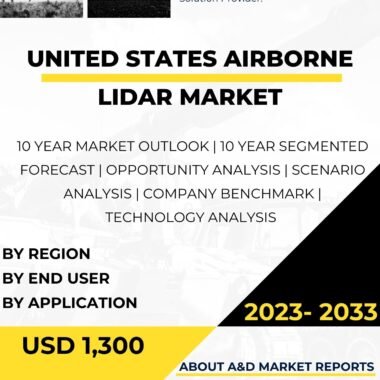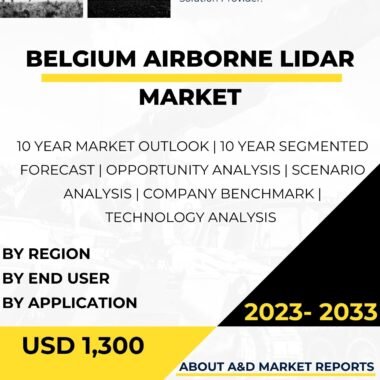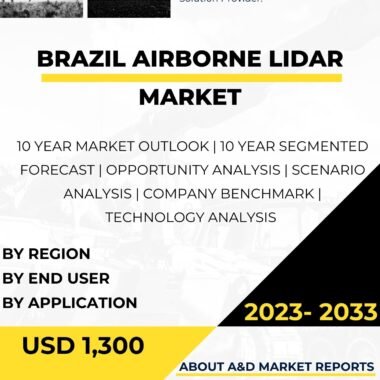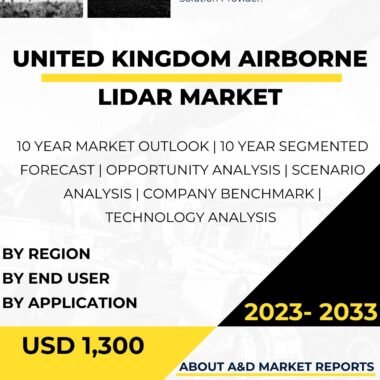Description
The Spain airborne LiDAR (Light Detection and Ranging) market is an emerging sector within the country’s geospatial and remote sensing industry. Airborne LiDAR technology utilizes laser sensors mounted on aircraft or drones to collect highly accurate and detailed three-dimensional information about the Earth’s surface. LiDAR systems emit laser pulses and measure the time it takes for the reflected light to return, allowing for the creation of precise elevation models, terrain mapping, vegetation analysis, and infrastructure assessment. Spain recognizes the potential of airborne LiDAR technology and is actively investing in its development and application for various sectors.
The primary driver for the Spain airborne LiDAR market is the growing demand for high-resolution and accurate geospatial data. Airborne LiDAR provides a unique capability to capture detailed elevation and terrain information with exceptional precision. This data is crucial for a wide range of applications, including urban planning, infrastructure development, environmental monitoring, forestry management, and disaster response. Spain’s focus on airborne LiDAR technology aims to improve data accuracy, enhance decision-making processes, and support sustainable development across various sectors.
Spain’s domestic geospatial industry plays a significant role in the development and application of airborne LiDAR technology. Spanish companies, such as GeoNumerics and IDOM, specialize in LiDAR data acquisition, processing, and analysis. These companies collaborate with government agencies, research institutions, and private enterprises to develop customized LiDAR solutions and provide geospatial services for specific applications. The domestic production and expertise in airborne LiDAR systems foster innovation, job creation, and economic growth within the country.
Collaborations with international partners and suppliers are also important for the Spain airborne LiDAR market. Spain often engages in partnerships with other European countries and global companies to share best practices, exchange knowledge, and access advanced LiDAR technologies. These collaborations enable Spain to benefit from technological advancements, leverage research and development efforts, and ensure interoperability with international standards.
The Spain airborne LiDAR market faces challenges such as technology advancements, data processing, and integration. Technological advancements are crucial to improve the performance and capabilities of LiDAR systems. Spain’s geospatial industry must invest in research and development to enhance sensor technologies, increase data acquisition efficiency, and develop advanced data processing algorithms. By staying at the forefront of LiDAR technology, Spain can ensure the competitiveness and effectiveness of its airborne LiDAR solutions.
Data processing is another challenge in the Spain airborne LiDAR market. LiDAR systems generate vast amounts of raw data that require efficient processing and analysis to extract meaningful information. Spain’s geospatial industry must invest in advanced data processing techniques, such as point cloud classification, feature extraction, and data fusion, to derive valuable insights from LiDAR data. Effective data management and analysis capabilities are crucial to maximize the utility of airborne LiDAR technology.
Integration of LiDAR systems into existing geospatial infrastructure is also a challenge for the Spain airborne LiDAR market. Successful integration requires coordination with geographic information systems (GIS), data repositories, and analysis tools. Spain’s geospatial industry must work closely with government agencies, municipalities, and private enterprises to ensure seamless integration of LiDAR data into existing workflows and decision-making processes.
In conclusion, the Spain airborne LiDAR market is an emerging sector that addresses the growing demand for high-resolution and accurate geospatial data. Spain’s domestic geospatial industry, collaborations with international partners, and investments in research and development contribute to the growth and development of the airborne LiDAR market. Overcoming challenges related to technology advancements, data processing, and integration will be crucial to maximizing the benefits of airborne LiDAR systems. By investing in airborne LiDAR technology, Spain aims to improve data accuracy, enhance decision-making processes, and support sustainable development across various sectors.




